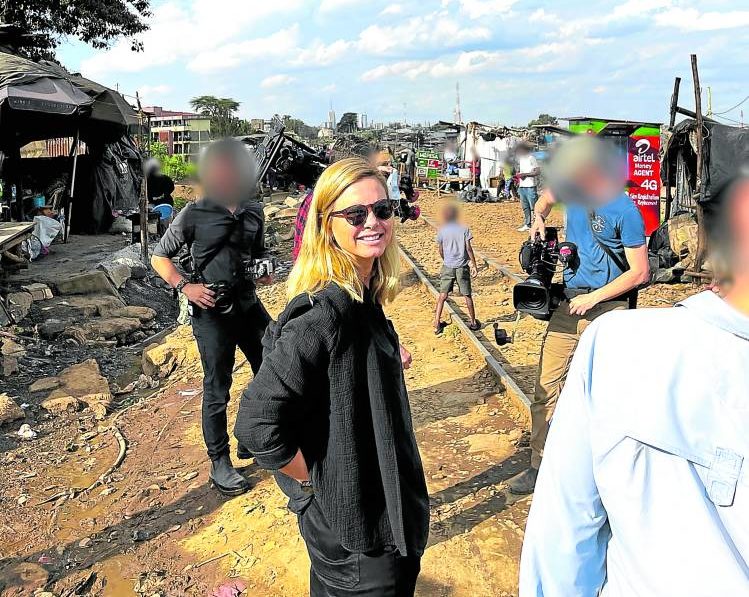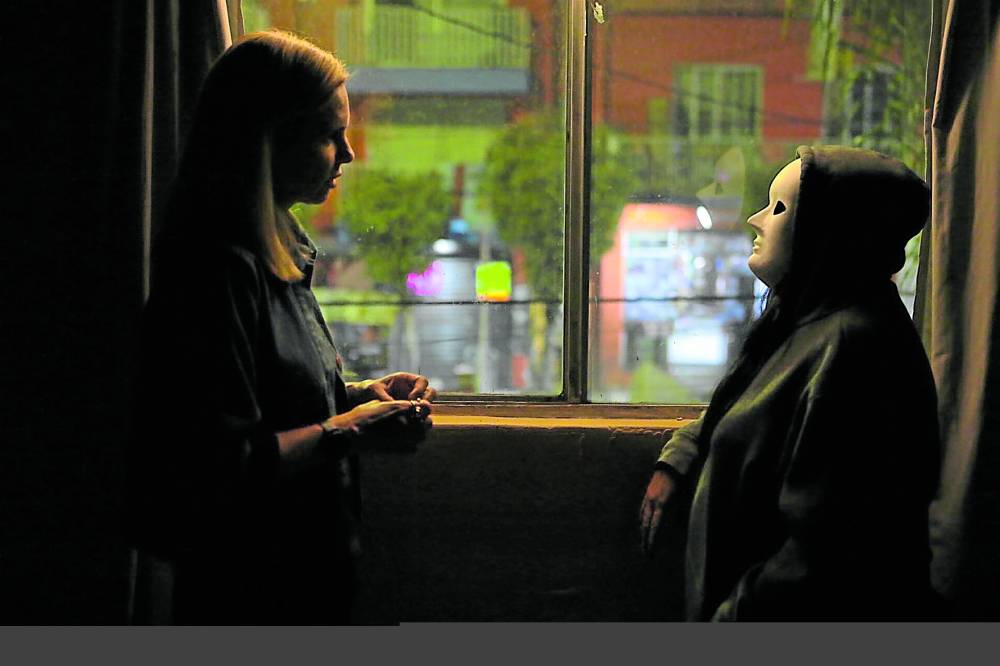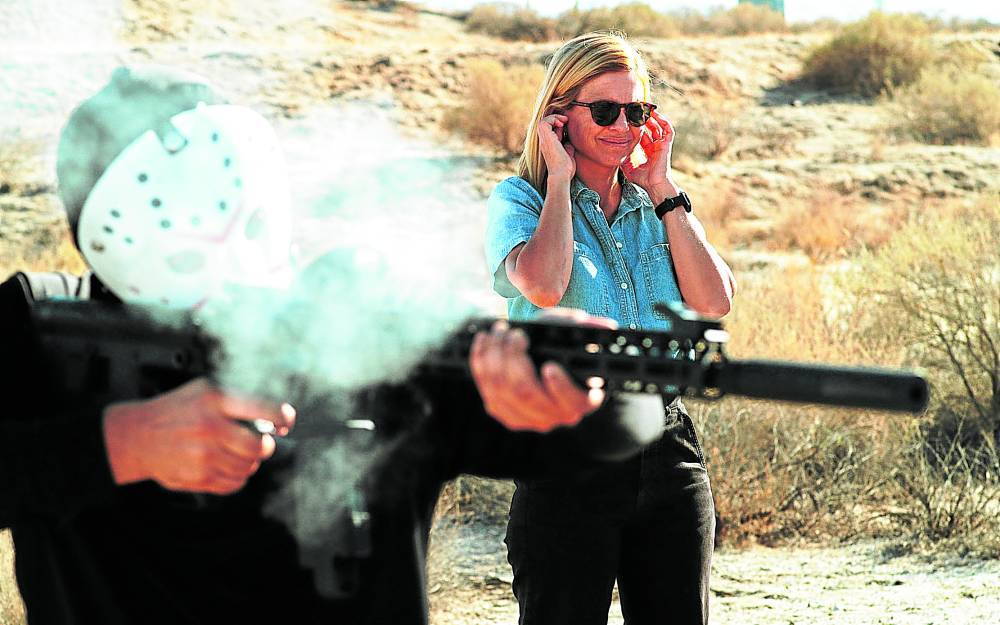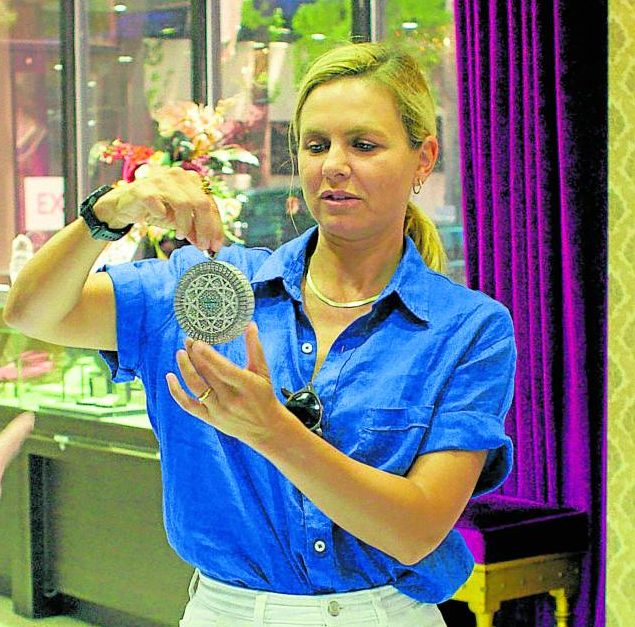Flipping the coin: Mariana van Zeller’s dark and hopeful insights into trafficking

Mariana van Zeller (center) in a small village in Kenya. Pictured below, she is investigating cryptoscams in Houston. —PHOTOS COURTESY OF NATIONAL GEOGRAPHIC
The world may never run out of scammers, crime rings and traffickers just waiting for every chance they could get to take advantage of people who are made more gullible or vulnerable by their most pressing needs.
But for more than two decades now, Peabody-winning investigative journalist Mariana van Zeller has been at the center of investigations that dare to expose these real-life goons and gangsters’ nefarious activities, risking life and limb to lift the tight lid on the complex inner workings of smuggling networks around the world.
In the 10-part third season of the Emmy-nominated documentary series “Trafficked with Mariana van Zeller,” which premieres on National Geographic at 10 p.m. tomorrow, the globe-trotting 46-year-old correspondent goes off the deep end as she takes viewers inside black markets.
On focus this time around are those involving transplant tourism and the sale of human organs, LSD, MDMA, ghost guns, smuggled oil, babies-for-cash surrogacy, credit card swindling, gang wars, cryptocurrency scams and bare-knuckle fighting.

The TV host (left) talks to masked gang member about smuggling human organs.
We always look forward to our no-holds-barred one-on-one chats with Mariana, not only because of the quotable quotes that always leave us mulling over the grim state of the world these days, but also because she is a no-nonsense interviewee who doesn’t suffer fools gladly—a trait that without a doubt serves her well in her perpetual quest for truth.
Indeed, while there’s something hair-raisingly sinister about coming face-to-face with the hooded shady figures she pursues, Mariana underscores the need to bring the issues to light. But what keeps her going after more than 20 years?
“Most important for me is, I realized very early on that there are black and gray markets out there that make up half of the global economy,” she said. “They have a deep impact on our daily lives, yet we know so little about them. So that has become my life’s mission.
“I focus on this part of the world that is secretive, protected and is often dangerous. I try to understand why these black markets exist and, most importantly, who operates them—because without knowing these people or understanding their motivations, we’re never going to figure out why they continue to exist.”

Dutch (left) fires a ghost gun while Mariana plugs her ears.
Our Q&A with Mariana van Zeller:
In some of the episodes, you ask your sources why they agree to go on camera, albeit with masks on, despite the danger. Despite putting their operations at risk, what do you think is motivating them to talk to you?
First of all, we give these people the opportunity to boast about what they do. Look, they’re the best at what they do—whether they’re making the drugs or scamming Americans out of their hard-earned savings or trafficking guns or drugs. Behind those masks and by altering their voice, we give them a chance to explain why they’re passionate about what they do.
Level of impunity
Secondly, there’s a certain level of impunity in a lot of the places that we report from. They’re allowed to operate where law enforcement really hasn’t done much to stop them and where governments are weak. And so, they really don’t see a downside to talking to an internationally trusted brand like National Geographic.
But the most important reason behind it is that very human characteristic that we all share … of wanting to be understood. These are people who realize they’re considered the “bad guys.” But I always tell everyone that I approach, “I am not here to judge you. I’m here to understand why this is happening.”
So, I come to them with empathy first—and I think that goes a long way. At the end of the day, even the ones who are doing things that we don’t condone are human beings, just like the rest of us. And all they want is to be understood.
The themes this season are more dangerous because they’re more “off the radar” than, say, cocaine or gun smuggling. What were the most dangerous episodes this time?
I’ve been covering the gun issue here in America for many years. But there were definitely very dangerous and scary moments when we were looking into guns this season. I started hearing about these untraceable, unlicensed, easy-to-assemble guns that were being found in crime scenes all over the country.
But once we started reporting about it, I found myself in the backyard of a gang member about 10, 15 minutes from my home in LA. Basically, they were building an arsenal from parts that he bought legally online, and we were there when a buyer came to purchase a gun that same night.
We told them ahead of time that there would be cameras there, and he agreed to be filmed. And yet, for some reason, he got very angry when he saw our cameras and started yelling at me and my crew.
We were able to eventually get out of there safely, but he still ended up using that gun and he ended up being arrested. And so, we were able to see the very tragic and serious impact that this issue has, where somebody else was affected because of guns.
I distinctly remember you telling me that the best stories are those that challenge our assumptions. What are the unexpected revelations or realizations for you this time around?
There’s an episode about babies, where we look into the surrogacy industry. It’s important for me because, here we are looking into a trade that we know is essentially exploiting women around the world—because surrogacy is illegal in a lot of countries—yet, there are a lot of people who can’t conceive their own babies. So, they resort to surrogacy.
We saw how women were being exploited, and we bore witness to the very dark side of that trade. But then, to be on location in a war zone in Ukraine with these Californian parents, who went there to meet the surrogate mother, then see them hold their baby for the first time, was a really beautiful moment.

Mariana van Zeller (center) in a small village in Kenya. Pictured below, she is investigating cryptoscams in Houston. —PHOTOS COURTESY OF NATIONAL GEOGRAPHIC
Emotional moments
This is where you sort of flip the coin and understand. And go, “Wait, there’s also a very important side to this trade, where you’re creating an opportunity for people who have dreamed of becoming parents all their lives.
As a mother myself, to witness that moment was truly special. It’s one of the most emotional moments we’ve ever filmed on the series. So, it sort of challenged my assumptions about this story because, here I was thinking I was going to cover an industry that was nefarious and perhaps shouldn’t exist, but to see how it can actually bring a lot of joy and hope to other people was just beautiful.
An episode about human organs mentions the black market in the Philippines, China and India. What are your insights into why this is more common in these places than others?
You know, there are 17 Americans who die every day because they wait in vain for organs that are out of supply. So, we know there’s demand. We were trying to look for where there’s a supply, and we found out that there are people offering their organs for money in countries like India, the Philippines and elsewhere.
The biggest message of the show is that the creation or existence of black markets happens because of inequality in this world.
There are people who have something to offer, and some people have money to buy it, while others are desperate for money and opportunities—and that’s very much what’s fueling the organ trade.
There’s a disturbing moment in that same episode where we see you watching a video of a donor getting sliced up alive. Are you still on the fence about this deeply contentious ethical issue?
Much like the drug war in America, so many of these black markets—like organ trafficking—are born because of broken systems. They exist because the system that is currently in place is broken.
In limbo
And that’s the case with the organ donation system in America and around the world. So many people are out there in limbo, not knowing if they’re going to live another day while they desperately wait for a life-extending organ that sometimes never comes.
This situation becomes fertile ground for black markets to exist. So, on the one hand, what that unforgettable episode did was to allow me to sit down with a desperate patient who bought an organ on the black market for over $100,000.
He looked at me in the eye and asked, “If you or your loved one were in my position, and they knew that for a certain amount of money they could pay for their own lives, would you not do what I did?”
And that also raised a lot of questions for me. Hopefully, it’s a situation that would explain the existence of black markets to viewers. But for each of us faced with that difficult position, the answer, whatever it will be, won’t come easily.
“Trafficked with Mariana van Zeller” Season 3 premieres on March 10 at 10 p.m. on National Geographic (channels 41/195 on SkyCable, channels 141/240 on Cignal and channel 65 on GSAT).